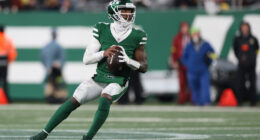Share this @internewscast.com
When it was finally over, Steve Clarke’s poker face had given way to a smile of contentment.
Scotland’s wait for a significant victory in Denmark’s capital now extends beyond 50 years, yet their chances of making it to the World Cup for the first time this century appear stronger than they did yesterday.
Clarke and his team delivered an impressive performance. To negotiate the toughest challenge of their upcoming six matches on paper without losing is an outcome everyone involved would have accepted before the match began.
Provided Belarus, who Scotland play behind closed doors in Hungary on Monday, are put to the sword, the portents will be promising.
On Thursday, Clarke had tried to underplay the importance of making a fast start in this truncated section, but he was fooling no one.

Steve Clarke was delighted to see his players earn a share of the spoils in the Danish capital

Scotland are aiming to secure a spot in the World Cup finals for the first time this century

Captain Andy Robertson led the players over to salute the Tartan Army at full-time
With six games, this qualification is a rapid process. Any team faltering early on will quickly fall behind. Scotland is already on track.
Though the birthplace of Hans Christian Andersen didn’t host a sporting fairy tale, Clarke’s team defied expectations to avoid defeat.
Scotland played without fear and with commendable discipline. They nullified their opponents and fashioned sufficient chances to sneak a victory.
While there is pride in kicking off the campaign with such a confident performance, there is also a hint of frustration at not securing all three points. It wouldn’t have been an undue outcome.
They created more chances than the group’s top seeds but lacked a decisive touch. Lyndon Dykes missed the best opportunity of the evening when he faced Kasper Schmeichel in the second half but couldn’t muster the pace to take advantage.
This was always a formidable task. For the thick end of 40 years, Denmark has punched well above its weight in producing footballers who are routinely snapped up by leading sides from the major European leagues.
Now under the stewardship of Brian Riemer, the clubs of those who employ the current wave of talent told its own story; Barcelona, Manchester United, Marseille, Porto and Napoli. Serious pedigree in depth.
Little wonder that the Parken Stadium had been such a difficult fortress to breach. The Danes had staged 12 games here since the 2022 World Cup, winning 10, drawing one and only losing to Spain. Little wonder the home supporters looked dejected at time-up.

Bournemouth teenager Ben Gannon Doak was a surprise omission from the starting lineup

John McGinn put in a tireless shift in the middle of the park to keep the Danes at bay
After two days of brilliant sunshine, the Tartan Army had spent the build up to the match sheltering from the elements.
It rained hard in Copenhagen throughout the day before relenting. It would have been perfect for a crew filming the latest Nordic Noir series. Less so for a visiting army clad in kilts and an impressive variety of retro dark blue jerseys.
Clarke’s line-up necessitated a double take. Despite predicting that Ben Gannon Doak would have a ‘big impact’ over the campaign, the manager thought better of paying him from the start. Likewise, Billy Gilmour, the squad’s most assured player in possession.
With Dykes partnering Che Adams in a 4-4-2, the concern was Scotland would by-pass the midfield and simply look to profit from second balls. Mercifully, there was also a desire to play through the thirds.
Clarke felt the body language of his players in training this week told him that they were ready to attack this campaign from the off. This belief was not misplaced.
Sitting deep, his side ensured the Danes had to work hard to find pockets of space. The frustration was the cheap turnovers of possession whenever the blue shirts tried to emerge and advance up the park. Scott McTominay and John McGinn were both fortunate they weren’t punished when they turned into trouble on the edge of their own box.
Dykes, typically, made his presence felt, barging into the Danish central defenders while the ball was still airborne. The tactic wasn’t pretty, but it gained Scotland territory.
The Birmingham man will feel he should have done better with a header when picked out by Andy Robertson’s curling cross. McGinn also seemed startled when Lewis Ferguson’s corner found him unmarked at the far post. He panicked then dumped the ball in the side net.

Lyndon Dykes came close to scoring but his shot was blocked by Rasmus Kristensen
A promising opening might well have been better. With the Danish defence stretched, McTominay went for goal when the overlapping Adams was the better option. Adams was also inches away from turning home Ryan Christie’s cross.
Scotland defended their box well. This was a matter of necessity given the amount of Danish possession and the number of crosses delivered by their wingers.
On the one occasion a visiting player didn’t get first contact on Rasmus Kristensen’s centre, John Souttar ensured Mika Biereth’s header didn’t find the target.
Lewis Ferguson hadn’t previously shown his true worth in a Scotland shirt, but he justified his inclusion here. He was the most effective of Clarke’s midfielders, rarely giving the ball away.
Scotland just lacked potency in the final third. McGinn’s deep cross sat up perfectly for Christie. The Bournemouth forward almost had too much time on his hands. His weak header went the wrong side of the upright.
With Scotland diligent and organised, the Danes laboured. Kasper Dolberg, the man who got away from Celtic last week, was on the periphery of the game in the first half. Grant Hanley succeeded in getting in the way of his only effort of note.
You expected an underwhelming Denmark side to have more about them after the break, but they didn’t awake from their slumbers.
McGinn’s curler would gave found the top corner had Joakim Maehle not thrown himself in the way. McTominay’s slalom ended with Kasper Schmeichel repelling the talisman’s strike with his legs.
Aside from a Pierre-Emile Hojbjerg strike — ushered round the post by the stretching Grant Hanley — Scotland looked assured.
This was a fine night’s work for Clarke and his players. To tick off the toughest of the six tasks they will face on paper over the next 75 days without suffering a loss was an outcome which all concerned would privately have taken before a ball was kicked.
There was no excuse for Dykes failing to open the scoring. Played in by Adams after a fine exchange between Aaron Hickey and McGinn, his hesitation allowed Kristensen to make up the ground and block.
Seconds later, Anders Dreyer’s strike from the edge of the box whistles inches wide.
Scottish hearts were in mouths when substitute Max Johnston was booked for handball while defending a punt up the park while last man. Having watched the incident on the pitch side monitor, German referee Daniel Siebert felt the yellow card sufficed.
Denmark threw on Rasmus Hojlund and increased the aerial bombardment. Gannon Doak, Kenny McLean and George Hirst provided much needed legs from the bench as the minutes ebbed away. Each played their part in securing a precious point.





